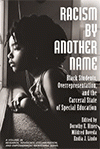
Racism by Another Name
Black Students, Overrepresentation, and the Carceral State of Special Education
Edited by:
Dorothy E. Hines, University of Kansas
Mildred Boveda, Pennsylvania State University
Endia J. Lindo, Texas Christian University
A volume in the series: Research, Advocacy, Collaboration, and Empowerment Mentoring Series. Editor(s): Donna Y. Ford, Ohio State University.
Published 2021
Racism by Another Name: Black Students, Overrepresentation, and the Carceral State of Special Education is a thought-provoking and timely book that provides a landscape for understanding and challenging educational (in)opportunities for Black students who are identified for special education. This book provides a historical and contemporary analysis through the eyes of Black children and their families on how they navigate and push against inequitable schooling, ways they are reframing discourse about race, dis/ability, and gender in schools, how educators, administrators, and school counselors contribute to disproportionality in special education, and ways that parents are collectively organizing to dismantle injustices and the carceral state, or criminalization, of special education.
Each chapter provides a ground level view of what Black students with dis/abilities experience in the classroom, and examines how the intersection of race, dis/abilty, and gender subject Black students to dehumanizing experiences in school. This book includes qualitative and quantitative approaches to exploring the material realities of Black students who are isolated, whether in separate or general education classrooms. Drawing from Critical Race Theory, DisCrit, Critical Race Feminism, and other race-centered frameworks this book challenges dominant norms of schools that reinforce inequality and racial segregation in special education.
At the end of each chapter the authors present practitioner-based notes and resources for readers to expand their knowledge of how Black students, their family, and guardians advocate for themselves and their own children. This book will leave educational advocates for Black children with a clearer understanding of the obstacles and successes that they encounter when striving for a just and equitable education. Furthermore, the book challenges readers to be active agents of change in their own schools and communities.
CONTENTS
Acknowledgments. Introduction: And We “Still” Are Not Saved. PART I—WHY ME?: STUDENT EXPERIENCES, IDENTITY, AND ABLEISM. Special Yet Unequal: Race, Disability, and the Prison Pipeline for Black Youth in America, Charles Bell. Illusions of Preparedness: Self-Concepts of African American Children with Learning Disabilities, Janelle Alexander. A Pattern of Practice: Federal Law and the Carceral State of Special Education for Black Girls, Dorothy E. Hines, Abiola Farinde-Wu, Ayana Allen-Handy, and Jemimah L. Young. The Carceral State Effect on My Swagger: An Exploratory Study of Being Young, Black, and Male in the U.S. Education Institution, Larry C. Bryant and Bryan E. Cichy-Parker. Mis-education at Woodson Middle School: Student Perceptions of a Magnet School Within a School, Erica D. McCray, D'Annette Mullen, Alexis J. Freeman, and Lourdes Santiago Poventud. PART II—INSIDE THE WALLS: TEACHERS, ADMINISTRATORS, AND SCHOOL COUNSELORS. In White Imaginations: A Synthesis of Research on White Teachers’ Colorblind Racism and Implications for Black Students in Special Education, Julia C. Ransom and Crystal M. Menzies. Overcoming Racism and Ableism: Why Are Black Students With Disabilities Overrepresented in Disciplinary Actions? Weadé James and Cassandra Willis. Preparing Teachers, Administrators, and Service Providers to Engage, Motivate, Support, and Educate Black Children and Adolescents, Denise K. Whitford. Challenging the Carceral State of Black Students With Disabilities in K–12 Schools: The Role of School Counselors, Renae D. Mayes and Erik M. Hines. PART III—PROTECTING OUR CHILDREN: PARENTAL ACTIVISM, COMMUNITY BUILDING, AND ENGAGEMENT. Whose Parenting Is Legitimate? School Positioning of Multiply-Marginalized Black Families and Consequences for Black Girls, Hailey Love, Subini Annamma and Amanda L. Miller. Carcerality, Special Education, and the State of Black Children and their Families, Ambra L. Green, Mattina Davenport, and Cynite Cooke. “They Never Listen to the Parent”: Parent Narratives at the Intersection of Anti-Black Racism, Disability and School Discipline, Tunette Powell and Stephanie Keeney Parks. Marronage Refusal: Racism and Special Education as Technologies of a Racial Carceral Democracy, Awo Okaikor M. Aryee-Price. Reconceptualizing Black Family Engagement in Special Education: Understanding the Motivations of Parents and Caregivers, Jolan M. Smith. Epilogue: Where Do We Go From Here? Appendix: Intersections of Race, Gender, Dis/ability, and Positionality. About the Authors. Index.
-
Paperback978-1-64802-447-4
Web price: $45.04 (Reg. 52.99)
-
Hardcover978-1-64802-448-1
Web price: $80.74 (Reg. 94.99)
- eBook978-1-64802-449-8

- EDU054000 - EDUCATION: Urban
- EDU026000 - EDUCATION: Special General
- EDU038000 - EDUCATION: Student Life & Student Affairs
-
 Black Women Mothering & Daughtering During a Dual Pandemic
Writing Our Backs
Black Women Mothering & Daughtering During a Dual Pandemic
Writing Our Backs
-
 Healing While Studying
Reflections and Strategies for Healing, Coping, and Liberation of Graduate Students of Minoritized Identities
Healing While Studying
Reflections and Strategies for Healing, Coping, and Liberation of Graduate Students of Minoritized Identities
-
 No Ways Tired: The Journey for Professionals of Color in Student Affairs
Volume II - By and By: Mid-Level Professionals
No Ways Tired: The Journey for Professionals of Color in Student Affairs
Volume II - By and By: Mid-Level Professionals
-
 No Ways Tired: The Journey for Professionals of Color in Student Affairs
Volume III - We've Come a Long Way: Senior-Level Professionals
No Ways Tired: The Journey for Professionals of Color in Student Affairs
Volume III - We've Come a Long Way: Senior-Level Professionals
-
 Purveyors of Change
School Leaders of Color Share Narratives of Student, School, and Community Success
Purveyors of Change
School Leaders of Color Share Narratives of Student, School, and Community Success
-
 R.A.C.E. Mentoring and P-12 Educators
Practitioners Contributing to Scholarship
R.A.C.E. Mentoring and P-12 Educators
Practitioners Contributing to Scholarship
-
 The Undivided Life
Faculty of Color Bringing Our Whole Selves to the Academy
The Undivided Life
Faculty of Color Bringing Our Whole Selves to the Academy

